- Home
- Chris Pourteau
Susquehanna
Susquehanna Read online
Susquehanna
A Second Tale of Bestimmung Company
by
Chris Pourteau
writing in the world of
Michael Bunker’s Pennsylvania
Text copyright (c) 2014 by James C. Pourteau. All rights reserved.
First Kindle Edition: October 2014
ISBN 978-0-9899813-3-0
Thank you for purchasing this ebook. It is a work of fiction. Any similarity to real persons, living or dead, is coincidental and not intended by the author.
Aspects of this story are inspired by the world of Pennsylvania, copyright (c) 2014 by Michael Bunker. Used with permission.
No part of this book may be reproduced, or stored in a retrieval system, or transmitted in any form or by any means, electronic, mechanical, photocopying, recording, or otherwise, without express written permission of the publisher.
Cover design copyright (c) 2014 by Dave Monk Fraser Adams. All rights reserved. Used by permission. http://www.lacunaverse.com/.
Illustrations copyright (c) 2014 by Ben Adams. All rights reserved. Used by permission. http://www.benjadams.com.
Editing by David Gatewood. http://lonetrout.com.
For Byron
Who loves a good adventure story as much as I do
And that’s a lot
Table of Contents
Dedication
All Our Food Belong to Whom?
The Ferryman
Riverwalk
Warpath
Guns and Butter and Bourbon
Afterword/Acknowledgments
About the Author
All Our Food Belong to Whom?
“Swing and a miss!”
One of the bar patrons thought she was a comedienne.
Stug’s momentum carried him through, and he caught himself against the bar. It shuddered under his bulk but it held. He could feel Garza, the loudmouth sergeant from A Company¸ moving behind him. So Stug played possum, stayed prone.
“What’s wrong, Miller?” Garza said in that annoyingly smooth Spanish accent of his. “Too much to drink? Or are you just getting old?”
Stug actually considered the question as he prepared to push himself up. Then he shrugged internally. He didn’t think he understood the concept too much to drink. And as for getting old? So what if he was in his early thirties? So maybe he woke with a few more pops and aches in the morning. They had yet to slow him down.
“Just stay right there, Garza,” he slurred without turning around. “And I’ll show you the difference a little experience makes.”
Stug flexed. The bar groaned. Garza centered himself.
In one smooth motion, Stug thrust himself up and back, right into Garza’s center mass, forcing air and surprise from the younger man. They both flew backward, their audience of soldiers parting around them like the Red Sea before Moses. Garza landed on his back on a wooden table, and their combined weights were too much for its shoddy workmanship. They appeared to hover in the air for a moment, then rode the splintered tabletop to the floor, crashing hard. Beneath Stug’s bulk, Garza took the worst of it. He wheezed, lungs aching.
“Man, you even moan with an accent,” Stug said.
Someone laughed.
“What the hell is going on here?”
The laughter tapered off quickly. Bodies parted as others pushed through. Someone—sounded like the comedienne—groaned her disappointment.
Captain Martin Seamus of A Company and Lieutenant Sean Hatch of B Company’s Alpha Squad pushed their way through the ring of soldiers surrounding the two men. Stug and Garza lay on the floor, one looking slightly confused, the other still trying to learn how to breathe again.
“Sergeants, I asked a question,” said Seamus.
“Nothing, sir,” wheezed Garza, rolling the bigger man off him. “Just a little fun.”
“Fun?” Seamus cast his eyes around. Not one, but two tables were flattened. Three chairs broken. He’d obviously arrived at this particular party a little late. And the bartender, a young corporal with freckles on her cheeks, looked justifiably annoyed and terrified at the same time. In his peripheral vision, Seamus noticed someone reluctantly tapping a uni bracelet against someone else’s—no doubt settling a bet. “You two thick apes destroy half the Rock Slide, and you call that fun?”
By now, both of the combatants were attempting to get to their feet.
“Sergeant Miller, explain yourself,” grumbled Hatch.
Failing to answer, Stug merely stood in a Zen-like state, swaying softly to a breeze only he could feel.
“Sergeant Miller!”
The big man blinked in surprise, as if he’d just been reminded that he was, in fact, alive. “What?” he answered, annoyed. Then, thinking better of his attitude, he added, “Nothing.”
“What?”
“It’s what Garza said. Nothing.” He burped. “Beg pardon. Sir.”
“Lieutenant . . .” began Seamus, at his wit’s end.
“Sir, if I may.” Hatch used the voice he preferred when trying to demonstrate to a superior officer his clear understanding of the military code of conduct. To his unsteady sergeant, he said, “Consider yourself on report, Miller.”
“Report? Just for having a little fun?”
“Now we’re back to fun,” said Seamus. “I thought it was nothing.”
Stug glanced at the bartender, then leered at the captain and winked. “Even a little nothing can be fun with the right person.” Sneering at his opponent, he said, “I wasn’t talking about you, Garza.”
“Report it is,” said Hatch, grabbing Stug by the arm and attempting to drag him out of the Slide. It’s like moving a cargo container full of okcy one-handed, he thought. “Captain Seamus, might I assume the same for your lunkheaded Spaniard?”
The captain frowned, debating internally, then nodded.
“Thank you, sir. Now, if you don’t mind, I’ll get my man to his bunk.”
“What about my bar?” called the freckle-faced bartender after them.
Hatch ignored her. The crowd parted, joking and laughing, as he lugged his burly friend out. Stug was muttering incoherently under his breath, difficult to hear over all the noise.
“What’d you say, meathead?”
“I said, why’d you have to be such an ass? Report? Whassup with that?”
“Because if I hadn’t taken control of the situation, you idiot, Seamus might’ve given you worse,” explained Hatch. “As it is, you get a mark on a piece of paper. Assuming I remember to file it.”
A soldier held the door for them as they made their way outside and into the cool October air.
“Ah,” said Stug. “Well, in that case, thanks for being such an ass.”
“Oh, it was my pleasure.”
Pound. Pound. Pound.
The inside of Stug’s head felt like the timing drum on an ancient Roman warship, its skin stretched to the limit by the constant beat of the pausarius, the officer who kept the men on the benches hard at their oars. And only one thin membrane for a drumhead to receive the drummer’s abuse.
On top of that, some demented bastard was shining a light in his eyes. He didn’t remember getting captured. So why was he being tortured?
Pound. Pound. Pound.
Now he understood Garza’s concept. In a hazy, half-remembered, not-sure-you-didn’t-dream-it-up kind of way. Maybe it was possible to drink too much.
I am getting old, Stug thought.
“If you don’t turn off that light, I’m going to snuff it out,” he growled at the tormentor standing over him. “And you won’t like how.”
Instead, the man holding the flashlight said, “Get up, vampire.”
Stug snarled and came up off his cot, lunging at the glare and the shadowy figure holding it. The m
an slid left easily, jerking the light ahead of the sergeant, who pursued it like a kitten with a new toy. Finally realizing he’d been tricked, Stug stopped in his tracks.
“You’re lucky I’m not Transport,” said Hatch. “Or you’d be dead.”
Mostly upright but swaying, Stug turned quickly to face his friend. He immediately regretted the movement. His hand went to his forehead. Had his brain just sloshed in its fastenings?
Pound. Pound. Pound.
He almost fell backward, then steadied himself on his feet.
“You’re lucky I’m still drunk,” said Stug. “Or you’d be flat. Turn off that torch from hell. Please.”
Hatch snapped off the flashlight. “The QB wants us in a briefing at oh-six-hundred,” he said. “Get some coffee in you and wipe the drool off your chin.”
Stug mechanically passed a lazy backhand across his stubble. Even that change in equilibrium made him sway a bit more. “What time is it now?”
“Oh-five-thirty,” said Hatch.
The sergeant gave him a disbelieving look. “You mean I could’ve slept for another . . .” He paused. Even the simplest math seems like rocket science when you’re drunk. “Twenty-five minutes?”
Hatch snorted. “You’re already on report, as soon as I get around to filling out the paperwork. Want to be a corporal again, too?”
Stug, tottering on his thick legs, gave the impression he was considering it. His hand rubbed over his sweating bald head, the simple movement almost sending him backward again. “Might be worth it.”
“Well, feel free to hit the bag again. But I wouldn’t want her mad at me.”
Stug swayed in cloudy contemplation. “I’ve seen her mad at you,” he allowed, finally finding his balance. “Okay, I’ll sober up. Damn it.”
Hatch grinned, enjoying the thought of his sergeant’s difficult road ahead. “Coffee’s over there. I’ll roust the others.”
Bracer and Hawkeye had imbibed significantly less than their sergeant the night before. Both were in their fatigues before Stug had finished half a cup of coffee.
“Feeling all right this morning, Sergeant?” asked Bracer, putting on his jacket. “You look a bit peaked after tangling with Garza.”
Stug gazed over the brim of his steaming cup of non-alcoholic beverage at the other man. His stare seemed to consider whether or not Bracer was secretly giving orders to the Roman officer pounding the inside of his skull. He didn’t say a word, but a low rumbling came from the back of his throat.
Bracer had passed tactics with flying colors. He knew when to retreat.
“All right ladies, let’s go. It’s quick chow this morning. Captain’s waiting,” said Hatch.
Walking across the compound in the pre-dawn darkness, Hatch watched the almost constant bustle of activity. Even in the dead of night, silence and stillness were rare. He observed the TRACE soldiers on the wall, some of them manning emplaced 18-millimeter machine guns like the one Bracer carried into combat. There were twelve positioned around the pentagonal walls of Little Gibraltar, the island fortress which TRACE cells south of the City had come to call home. Its walls were overgrown with strategically interlaced vines that hid their stony sides. Tall red cedar and pine trees hugged the outer walls, as if Mother Nature embraced the rebel stronghold in her protective arms.
Part town, part base, part fort, Little Gibraltar sat squarely on an island in the middle of the Susquehanna River. Some said God Himself had skipped a huge stone along the length of the river, commanding it to land here. The river itself was named for the Susquehanna that flowed through the heart of Old Pennsylvania back on Earth. It had been a route for exploration and trade on the Old Planet, first for the Native Americans, then for the Europeans who’d displaced them.
The chow line was moving a little quicker than usual this morning, Hatch noticed. Then he saw why. One splat of eggs, two pieces of bacon, one piece of bread, one cup of coffee. No fruit.
“We’re on half rations,” Bracer said, stealing the words from the lieutenant’s thoughts.
Stug groaned. Despite his behemoth stature and generally affable nature, the man had the annoying whine of a five-year-old boy who’s been told he can’t have a second cookie. It was most maddening when it surfaced in the middle of combat. The threat of death had a way of accentuating the big man’s complaints in a way that wrapped a fist around Hatch’s spine and squeezed.
“I’ll never get sober on bird feed,” the sergeant complained.
As the line moved along, Hatch turned back and thumped the sergeant’s belly with the back of his hand. “You might get a little thinner, though.”
Stug sneered. “Women like me this way.”
“Women like you?” Bracer asked playfully.
The sergeant moved forward in line, holding out his tray to the server. “If I weren’t still drunk . . .”
“A cloudy day,” said Hawkeye, glancing up. He was always the first to notice anything that might obscure visibility or limit line of sight.
Hatch looked up at the sky as he made his way to a bench. One cloudy day wasn’t a problem. Two cloudy days were worrisome. Three cloudy days could kill them.
Little Gibraltar was protected by a huge version of the Umbrella, a solar-powered energy shield used by TRACE companies to protect base camps from prying Transport eyes. The name for the system was a bit of a misnomer, since the Umbrella was modulated to allow infrared light from scouting drones to penetrate its dome—it just wasn’t allowed to return to its source after pinging a target. In short, scans could enter the Umbrella, but they couldn’t get out. So unless a drone or dropship flew directly overhead or spotted the machine guns on the fortress’s carefully camouflaged walls, Transport would never see them. Unfortunately, the solar batteries that powered the Umbrella could only store sixty hours of energy, give or take—that meant that three days of dark clouds would cause the system’s power to fail. And with its camouflage gone, Little Gibraltar would be exposed.
“It’ll blow over,” Stug mumbled, stabbing three pieces of fatback bacon and stuffing the greasy taste of heaven into his mouth. “No rain today,” he mumbled. “Can’t smell it.” His head still pulsed, but now that he’d begun eating, the Roman officer had been replaced by a little drummer boy banging on a tin can.
Hatch glanced up again. Except for the ominous clouds, the skies were clear. Transport rarely flew aircraft down the Susquehanna or over the tear-shaped isle of Little Gibraltar, which was why the resistance had chosen it for their base. Located some twelve miles downstream from the City, the island was off the Authority’s main flight paths, but close enough for quick access to the Amish Zone, where TRACE got most of its food.
Though the pacifistic Plain People refused to fight directly in TRACE’s generations-long war against Transport, they often supported the struggle in less direct ways. The Amish had known the iron boot of intolerance for six hundred years, so they were sympathetic to the rebels’ fight against the Authority’s tyranny. The eggs, milk, bacon, jerked beef, fresh fruit, and vegetables that flowed covertly to the island came directly from them. Without it, TRACE soldiers would starve or be forced to requisition food from the smaller homesteads of New Pennsylvania, and that would likely breed resentment in the very population they were fighting to free.
The food was brought west across the plain from the AZ by wagon in the dead of night. Moving the supplies by airbus would have been far too visible to Transport, even if no flight plans were filed. Newly manufactured weapons and other technical goods also arrived under the cover of darkness, although these came down the Susquehanna from the City.
It was the SOMA himself who had suggested the strategy of moving supplies and materiel the old-fashioned way, by wagon and ferry. All of this was illegal, of course, since movement was strictly regulated by Transport, but the irony of subverting the Authority’s control by low-tech means had only enhanced the SOMA’s legend among his TRACE soldiers.
The fact that they were on half rations told Hatch t
hat the food, at least, had come into short supply—and that was a problem even more pressing than three cloudy days in a row. Little Gibraltar was a vital link in the supply chain that fed TRACE’s entire resistance network. A great deal of food passed through the fort on its way to soldiers in other theaters of the war, so if Little Gibraltar was feeling the pinch, so was the rest of TRACE.
The fort was a distribution hub for materiel as well, including laser weapons manufactured via 3-D printers in the City and powered by the okcillium secured in the Battle of Gettysburg six months earlier. His own squad was armed with the modern weapons now, though they also carried old-fashioned .50-caliber sidearms on their hips. His people had worked with advanced technology long enough to know how little they could trust it.
“You through yet?” asked Stug, breaking Hatch’s concentration. “We’re due with the QB in two minutes.” The sergeant must be sobering up at last; he could tell time again.
“Well. We don’t want to start the day on the wrong foot, do we?” asked the lieutenant sarcastically.
Alpha Squad took their seats at the briefing. Bravo, Charlie, Delta, and Echo squads were already there. Hatch assessed them as the other companies gathered.
There were a lot of new faces in the room. Bestimmung Company had absorbed soldiers from other units to fill its own ranks, depleted after Gettysburg; some had seen action in theaters as far west as the Great Shelf. Other changes had happened internally. Sergeant Emma “Pusher” Ellis, who’d lost her entire squad covering the retreat of the rest of the company from Gettysburg, now played mother to Echo Squad, which carried B Company’s two heavy chain guns.
“Ten-hut!”
Everyone stood as Colonel Obadiah Neville entered the room. He commanded the three assembled companies. Behind him came his company commanders, including B Company’s Captain Mary Brenneman. The good colonel had dubbed her his own personal “Queen Bitch” for her less-than-respectful attitude toward him. But in admiration for her ability to make quick decisions in the field, decisions that had saved their lives many times, her troops in B Company had shortened the nickname to “QB.”

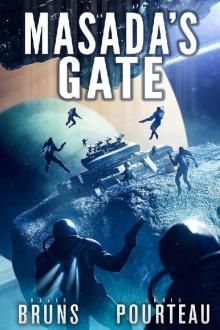 Masada's Gate
Masada's Gate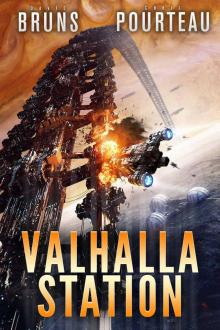 Valhalla Station
Valhalla Station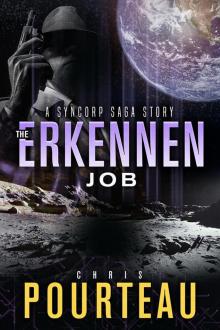 The Erkennen Job
The Erkennen Job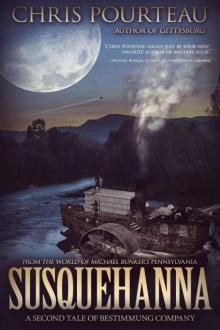 Susquehanna
Susquehanna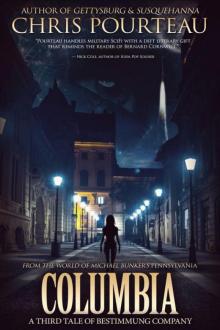 Columbia
Columbia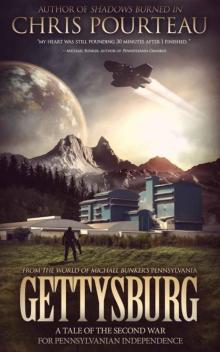 Gettysburg: A Tale of the Second War for Pennsylvanian Independence
Gettysburg: A Tale of the Second War for Pennsylvanian Independence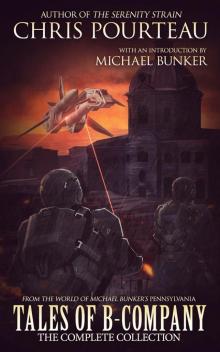 Tales of B-Company: The Complete Collection
Tales of B-Company: The Complete Collection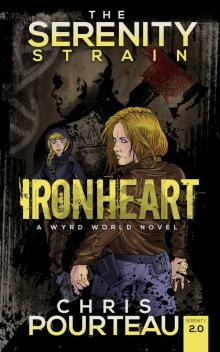 Ironheart (The Serenity Strain Book 2)
Ironheart (The Serenity Strain Book 2)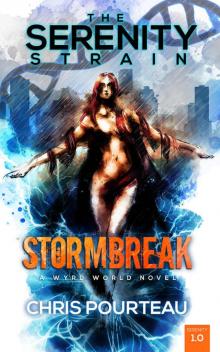 Stormbreak (The Serenity Strain Book 1)
Stormbreak (The Serenity Strain Book 1)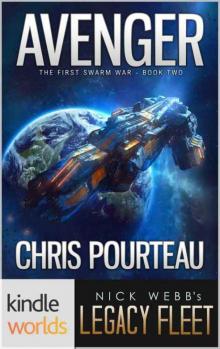 Legacy Fleet: Avenger (Kindle Worlds) (The First Swarm War Book 2)
Legacy Fleet: Avenger (Kindle Worlds) (The First Swarm War Book 2) Shadows Burned In
Shadows Burned In